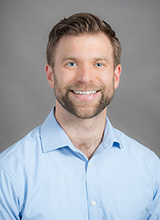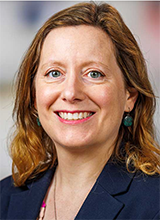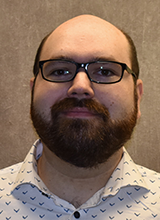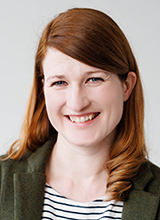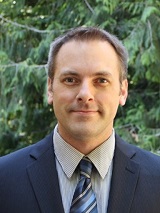I am an Acting Assistant Professor in the Department of Psychiatry and Behavioral Sciences at the University of Washington, primarily working clinically at Harborview Medical Center. I work with the Recovery Clinic, Intake and Brief Intervention Services (IBIS), the Behavioral Health Integration Program (BHIP), and Addiction Consult Service.
I am fellowship-trained in Addiction Psychiatry, and board certified in both general and addiction psychiatry by the American Board of Psychiatry and Neurology. My passion is providing excellent, compassionate and comprehensive psychiatric care to my patients regardless of background or resources. I believe quality healthcare is a human right for all people and am excited help make that a reality as part of the Harborview system.
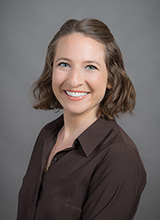
Dr. Samantha J. Reznik (she/her) is an Assistant Professor and licensed clinical psychologist in the Department of Psychiatry and Behavioral Sciences at the University of Washington School of Medicine. She is the Director for Seattle Children’s Psychosis Program, providing holistic mental health care to support individuals with psychosis ages 13-21 to reach goals aligned with personal values and passions. With a commitment to research, training, and clinical leadership in serious mental illness (SMI), she strives to create meaningful change in mental health services, ensuring individuals receive the recovery-oriented care they deserve.
As an investigator at the Supporting Psychosis Innovation through Research, Implementation, & Training (SPIRIT) Center, she focuses on dissemination and implementation research to increase access to and quality of care for individuals with SMI and other underserved populations. She currently supports the Central Assessment for Psychosis (CAPS) project to increase access to psychosis assessment and reduce barriers to early psychosis treatment engagement across Washington. She is also committed to advancing SMI and health service psychology training and is actively involved in related national service, including serving as the Chair-Elect of the APA SMI/SED Subsection and founding member and Co-Chair of SMI Future of Academia, Training, and Education (FATE) committee to advance doctoral psychology training in SMI.
Dr. Reznik earned her PhD in Clinical Psychology at the University of Arizona with a focus on psychophysiology and intervention science. Her clinical training included a Health Resources and Services Administration (HRSA)-funded Underserved Track clinical internship at University of Kansas Medical Center as well as an advanced clinical fellowship in rehabilitation and recovery for SMI at VA San Diego Healthcare System/University of California San Diego. She was previously a Research Assistant Professor at the University of Texas at Austin and investigator with the Advancing Early Psychosis Intervention Network in Texas (EPINET-TX) project.
I am a consult psychiatrist and clinical instructor at the Fred Hutch Cancer Center. I work with people undergoing active cancer care. I previously practiced in the VA outpatient mental health clinic with veterans with mood disorders, anxiety, post-traumatic stress disorder, and chronic and serious mental illness. I recently worked as a consult psychiatrist with the Swedish Primary Care Clinics, address a wide variety of concerns in a collaborative behavioral health care setting. I enjoy being a part of medical education, both learning and teaching. However, patient care always comes first.
I am a trained Behavioral Psychologist with a PhD in Health & Human Performance. The main goal of my work is to reduce substance-related harms and improve quality of life for people experiencing problems related to their substance use. I work closely with community members who use drugs to inform my line of research and address key needs identified. My primary appointment is at the Harm Reduction Research and Treatment (HaRRT) Center within the UW School of Medicine and hold an Affiliate Faculty appointment within the School of Public Health. My aim is to adapt, refine, and disseminate harm reduction programs through digital health interventions to empower individuals and ameliorate substance-related harms.
I am an Assistant Professor in the Department of Psychiatry and Behavioral Sciences at the University of Washington. I received my MD from the University of Arkansas for Medical Sciences, and completed my General Psychiatry Residency at the same institution. I completed a fellowship in Consultation-Liaison Psychiatry (formerly Psychosomatic Medicine) at the University of Washington. I have academic interests in the intersection of medicine and psychiatry, LGBTQ mental health and wellbeing, and medical education. I currently see patients at Harborview Medical Center’s Madison HIV Clinic.
Koriann Cox, Ph.D. graduated from Northeastern University and is licensed in the state of Washington. She completed a postdoctoral fellowship in co-occurring addiction and mental health and has a range of clinical experience with a variety of concerns including depression, anxiety, trauma, reproductive mental health, and substance and behavioral addictions. Dr. Cox’s strengths-focused approach emphasizes the mutual development of goals for therapy and ongoing collaboration between herself, the patient, and the care team. Dr. Cox uses a number of therapeutic modalities including but not limited to Cognitive Behavioral Therapy, Acceptance and Commitment Therapy, and Cognitive Processing Therapy.

Dr. Charles Engel is Professor in the Department of Psychiatry and Behavioral Sciences at the University of Washington School of Medicine, Core VA HSR Investigator in the Seattle Center for Innovation, Co-Director of the Center’s Advanced Fellowship on Health Systems Research, and Adjunct Physician Policy Researcher at the RAND Corporation. Engel’s work focuses on trauma-informed health systems and strategies for improving the quality of primary care for chronic mental and physical health conditions. His research has covered traumatic injury and post-trauma syndromes ranging from blast injury, mild traumatic brain injury and Gulf War syndrome to PTSD and depression. Engel is experienced at mixed qualitative and quantitative methods and has led large pragmatic randomized trials, program evaluations, and implementation science studies. He has authored or coauthored nearly 200 scholarly papers, including in the New England Journal of Medicine, JAMA, and the American Journal of Psychiatry. Funding for his work has come from the National Institutes of Health, Centers for Disease Control, Department of Veterans Affairs, Department of Defense and other organizations. Before joining UW Psychiatry and the AIMS Center in 2021, Dr. Engel was Senior Physician Policy Researcher at the RAND Corporation from 2013 to 2020 and Associate Chair (Research) at Uniformed Services University’s Department of Psychiatry from 2001-2013. Engel has served on the board of directors of the International Society for Traumatic Stress Studies, has testified twice before Congress, received a number of awards, and delivered invited lectures in over 10 countries. He received both his MD and MPH from the University of Washington.
My primary areas of research include artificial intelligence, AI/machine ethics, behavioral health technologies, telemedicine, telehealth, forensic psychology, and military and Veteran population health. I’ve consulted widely on the topic of military and veteran health and technology in healthcare and have helped to develop national guidelines for telemental health, clinical best practices for technology-based treatments, and standards for human-AI interaction transparency. My vision is to build, and help others to build, technologies that help promote behavioral change and that improve the lives of people.
